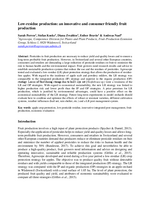Presentation at IOBC Meeting: Low-Residue: an innovative and consumer friendly fruit production
Pesticides in fruit production are necessary to reduce yield and quality losses and to ensure a long-term profitable fruit production. However, in Switzerland and several other European countries, consumers and retailers are demanding a large reduction of pesticide residues on fruit to minimize the risk to human health and the environmental impact. Fruit growers need research results and advice to establish sustainable production systems that reduce the use and the residues of pesticides. Agroscope tested and evaluated a low-residue (LR) plant protection strategy that allows the production of residue-free apples. With regard to the incidence of apple scab and powdery mildew, the LR strategy was comparable to the integrated production (IP) strategy and superior to the organic production (OP) strategy. Losses of fruit during storage due to bull’s eye rot (Neofabraea sp.) were a weakness of the LR and OP strategies. With regard to economical sustainability, the new LR strategy was linked to higher production risk and lower profit than the IP and OP strategies. A price premium for LR production, which is justified by environmental advantages, could have a positive effect on the economical sustainability of the LR strategy. Future long-term experiments in model orchards should evaluate how to combine and optimize the effects of robust or resistant varieties, different cultivation systems, weather influences (hail net, rain shelter, etc.) and a LR pest management system.Documents

|
Low-residue production: an innovative and consumer friendly fruit production () |
Details
- Activity type
- Participation in scientific conference
- Activity work package
- Reduction in pesticide residues
- Activity number
- Agroscope-WP3-A11
- Activity contact
- Andreas Naef
Agroscope
Schloss 1
Postfach
8820 Wädenswil
Schweiz
Tel. +41 58 460 62 57
E-Mail: [email protected]
- Activity partner
- AGROSCOPE
- Activity country
- Switzerland
- Last edit
- 17-10-2017

The EUFRUIT thematic network has received funding from the
European Union's Horizon 2020 research and innovation programme
under grant agreement No 696337.
European Union's Horizon 2020 research and innovation programme
under grant agreement No 696337.